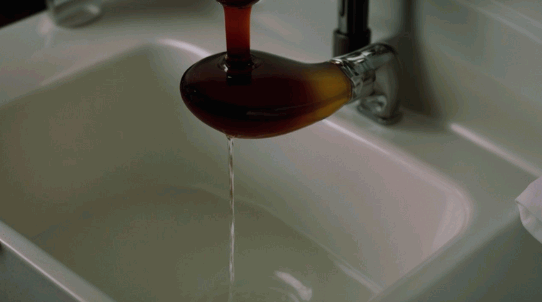Clogged drains are a common household nuisance, causing inconvenience and frustration. Fortunately, using vinegar as a natural cleaning solution can effectively tackle this issue without harsh chemicals.
In this comprehensive guide, we will explore the causes of clogged drains, the benefits of using vinegar to clean them, and a step-by-step process for cleaning drains with vinegar. From gathering supplies to understanding the environmental and cost-effective advantages of this method, we will cover everything you need to know to maintain clean, odor-free drains. We will address any potential risks or side effects associated with using vinegar and provide recommendations for the frequency of drain maintenance.
Whether you are environmentally conscious, cost-conscious, or simply seeking a safe and effective method to keep your drains clear, this article will equip you with the knowledge and tools to effectively clean your drains using vinegar.
What Causes Clogged Drains?
Clogged drains can be caused by various factors, including the accumulation of grease, food particles, and other debris in kitchen drains, leading to a blockage that hinders proper drainage.
This can be exacerbated by inadequate maintenance of drainage systems, as well as the disposal of non-biodegradable materials down sinks and drains. Grease buildup, in particular, can be a persistent issue, as it solidifies over time, narrowing the passageways for water flow. Food particles often contribute to blockages, especially when not appropriately disposed of.
To combat these concerns, natural solutions such as periodic hot water flushing and using enzymatic cleaners can aid in prevention, alongside regular professional maintenance to ensure efficient drainage.
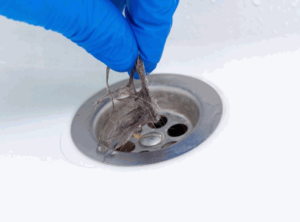
Why Use Vinegar To Clean Drains?
Vinegar is a popular choice for cleaning drains due to its natural, eco-friendly properties and its effectiveness in breaking down grease, eliminating odors, and preventing bacterial growth within the pipes.
Its acidic nature allows vinegar to dissolve grease and grime, helping to clear clogs and maintain a smooth flow of water. In addition, its powerful deodorizing properties effectively neutralize unpleasant smells, leaving drains smelling fresh.
Using vinegar not only helps in maintaining clean and clear drains but also reduces the need for harsh chemical-based cleaners, contributing to a more environmentally friendly and sustainable cleaning routine.
With its versatility and efficiency, vinegar is a go-to solution for keeping drains clean and free from blockages.
Take a look: What Drain Cleaner Is Best For Toilets
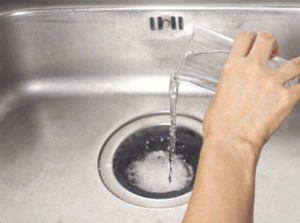
How To Clean Drain With Vinegar?
Cleaning a drain with vinegar involves a simple DIY method that can be executed using household ingredients, providing an effective and budget-friendly solution for maintaining clean and odor-free drains.
To start, pour about a cup of baking soda down the drain, followed by an equal amount of vinegar. Then cover the drain to allow the mixture to work its magic for about 30 minutes. Afterward, flush the drain with hot water to clear away any remaining residue. This process not only helps to break down debris and eliminate odors but also serves as a preventive measure to keep your drains clog-free. It’s a natural and eco-friendly approach that saves you from relying on harsh chemicals and expensive cleaning products.
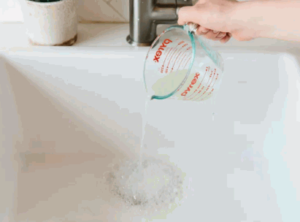
Gather Supplies
Before starting the cleaning process, gather the necessary supplies for cleaning the drain with vinegar, ensuring that you have all the DIY ingredients and tools readily available for the task.
For this DIY method, you will need:
- white vinegar
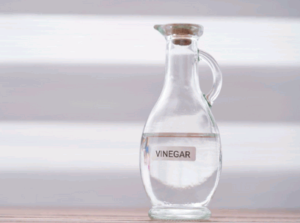
- baking soda
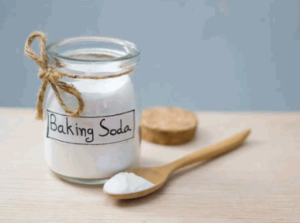
- a pot of boiling water
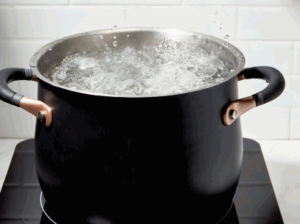
- a drain stopper or rag
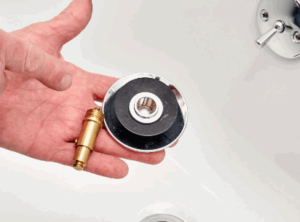
These items will form the basis of the cleaning solution. Make sure to have a plunger, a drain snake or brush, and protective gloves to effectively tackle any stubborn clogs. It’s important to select high-quality vinegar and baking soda for optimal results. With these supplies at hand, you can confidently proceed with the drain cleaning process using vinegar.
Remove Debris From The Drain
The first step in cleaning a drain with vinegar involves removing any visible debris or clogs from the drain to ensure that the vinegar solution can effectively penetrate the pipes and address the underlying blockage.
This is a crucial aspect of the process as any blockages can hinder the effectiveness of the vinegar solution. Clearing debris and clogs allows the vinegar to reach and dissolve the buildup inside the pipes. It also helps in identifying any larger issues that may require professional attention. Therefore, taking the time to thoroughly clean the drain before using the vinegar solution is essential for achieving optimal results in clearing the blockage.
Pour Boiling Water Down The Drain
After clearing the debris, the next step is to pour boiling water down the drain to help loosen any remaining grease or particles, preparing the drain for the vinegar-cleaning solution.
The hot water helps to break down and flush out any stubborn build-up within the pipes, making it easier for the vinegar solution to effectively dislodge and dissolve any residual gunk. This simple yet effective method can be incorporated into regular household maintenance to prevent clogs and keep the drains flowing smoothly. DIY enthusiasts often find this approach beneficial for keeping drains odor-free and maintaining a healthy plumbing system. As a practical and cost-effective solution, using boiling water and vinegar can contribute to the overall cleanliness and functionality of your drains.
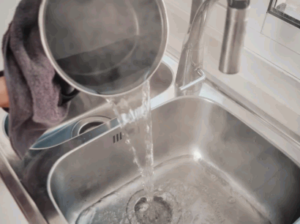
Pour Baking Soda Down Drain
The subsequent step involves pouring baking soda down the drain, allowing it to react with any remaining residue and odors, contributing to the overall cleaning process.
It’s important to ensure that the baking soda reaches deep into the drain by gently tapping the sides or using a long-handled spoon to guide it down. Once the baking soda is in place, it can be left to work its magic for at least 30 minutes, giving it adequate time to dislodge any buildup.
For more stubborn clogs or persistent odors, consider combining the baking soda with vinegar for a fizzing action that can help break down tough blockages and eliminate foul smells.
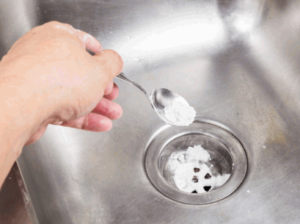
Pour Vinegar Down The Drain
Next, pour vinegar down the drain to initiate the cleaning process, leveraging its natural properties to address clogs, eliminate odors, and break down grease within the pipes.
This technique of using vinegar is particularly beneficial since its acidic nature helps to dissolve and dislodge debris and buildup that may cause clogs in the drain. The antimicrobial properties of vinegar aid in neutralizing and eliminating unpleasant odors, leaving behind a fresh and clean scent. Its ability to cut through greasy residue makes it an effective solution for removing stubborn grease buildup, ensuring optimal drainage and overall cleanliness.
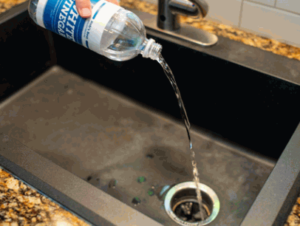
Let Sit For 30 Minutes
Allow the vinegar and baking soda mixture to sit in the drain for approximately 30 minutes, enabling it to penetrate the pipes and address any lingering clogs or bacterial growth effectively.
This waiting period allows the acidic nature of the vinegar to break down and dissolve any accumulated debris or organic matter within the drain. As the baking soda and vinegar interact, the foaming action helps dislodge stubborn residue, ensuring a thorough cleaning process. The combined reactive properties of vinegar and baking soda also create a hostile environment for bacterial growth, contributing to a more hygienic and odor-free drain system. Allowing the mixture to sit optimizes its cleansing potential and promotes a more efficient and environmentally friendly maintenance approach.
Flush With Hot Water
Complete the cleaning process by flushing the drain with hot water, ensuring that any remaining residue and cleaning solution is thoroughly rinsed from the pipes, leaving the drain clean and odor-free.
To effectively flush the drain with hot water, boil a pot of water and carefully pour it down the drain in a slow, steady stream. The hot water will help to dissolve any lingering buildup and wash it away. Adding a cup of vinegar before the hot water can further break down grease and grime. For regular maintenance, repeating this process once a week can prevent clogs and keep your drain running smoothly. Remember to exercise caution when working with hot water to avoid burns or scalding.
What Are The Benefits Of Using Vinegar To Clean Drains?
Using vinegar to clean drains offers several benefits, including its natural and eco-friendly properties, its ability to eliminate bacteria and foul odors, and its effectiveness in preventing future blockages.
This natural cleaning agent is not only safe for the domain but also for individuals using it. Vinegar’s acidic properties help break down organic materials and mineral deposits, effectively removing buildup that can lead to clogs. Its antibacterial properties make it an excellent choice for disinfecting and deodorizing drains, ensuring a clean and fresh-smelling environment. By regularly using vinegar to maintain drains, you can prolong their lifespan and minimize the risk of costly plumbing issues.
Environmentally Friendly
One of the key benefits of using vinegar to clean drains is its environmentally friendly nature, as it offers a natural and non-toxic solution for maintaining clean and healthy drainage systems at home.
This eco-friendly approach not only ensures the safety of your household members and pets but also contributes to a cleaner environment by avoiding the use of harsh chemicals that can harm ecosystems. The use of vinegar reduces the need for single-use plastic bottles typically associated with commercial drain cleaners, thus promoting sustainable and responsible consumption.
By incorporating vinegar into your home maintenance routine, you can actively participate in minimizing your ecological footprint and promoting a natural and green lifestyle.
Cost Effective
Another advantage of using vinegar for drain cleaning is its cost-effectiveness, providing a budget-friendly and efficient solution for routine maintenance and preventing costly plumbing issues.
This natural and eco-friendly approach to drain cleaning not only saves money on expensive commercial cleaners but also helps to maintain a healthy and clog-free plumbing system. By incorporating vinegar into your regular home maintenance routine, you can prevent the buildup of debris and grime, reducing the need for professional intervention and costly repairs. The acidic properties of vinegar make it an effective agent for breaking down organic matter and disinfecting your drains, ensuring a clean and odor-free environment in your home.
Kills Bacteria And Foul Odors
Vinegar effectively kills bacteria and eliminates foul odors within drains, providing a natural and efficient solution for maintaining clean and hygienic drainage systems in the home.
Its antibacterial properties make it effective in removing harmful microbes that can lead to clogs and unpleasant smells. Vinegar’s ability to break down organic matter helps in preventing blockages and maintaining the smooth flow of water. Its odor-eliminating capabilities ensure that the drains remain fresh and clean, contributing to a healthier environment at home. This natural cleaning agent not only offers a cost-effective solution but also reduces the need for harsh chemicals, promoting eco-friendly and sustainable drain maintenance practices.
Safe For Pipes
Using vinegar for drain cleaning is safe for pipes, as it does not cause damage or corrosion, making it a reliable and preventative solution for addressing and preventing blockages in the drainage system.
Its non-corrosive nature makes it an ideal choice for regular maintenance, helping to remove buildup and debris without harming the pipes. By utilizing vinegar as a natural alternative to harsh chemical cleaners, homeowners can effectively keep their drainage systems free from clogs while also preserving the integrity of the pipes.
The acidic properties of vinegar work to dissolve organic materials, further aiding in the prevention of blockages and ensuring a smoothly functioning drainage system.
Are There Any Risks Or Side Effects Of Using Vinegar To Clean Drains?
While vinegar is generally considered safe for drain cleaning, there are minimal risks or side effects associated with its use, particularly when used in accordance with recommended cleaning guidelines.
Vinegar is a natural, non-toxic alternative to harsh chemical drain cleaners, making it a popular choice for eco-conscious individuals. It’s important to acknowledge that while vinegar can effectively help break down some clogs and tackle mild odors, it may not be as effective for more stubborn blockages. In some cases, the acidic nature of vinegar could potentially cause damage to certain types of plumbing or fixtures, so it’s essential to be mindful of this and consider consulting a professional if uncertain.
How Often Should You Clean Your Drains With Vinegar?
To maintain clean and odor-free drains, it is recommended to clean the drains with vinegar on a monthly basis, as part of a proactive maintenance strategy to prevent blockages and ensure optimal drainage performance.
Regular cleaning with vinegar helps to break down buildup and debris, preventing clogs and maintaining free-flowing drains. This proactive approach also eliminates foul odors and reduces the potential for costly plumbing issues. By incorporating vinegar cleaning into your monthly routine, you can effectively prolong the longevity of your drainage system and minimize the need for extensive repairs or interventions.

